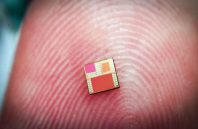In an important step toward performing medical diagnoses using handheld devices, the researchers have adapted silicon chip technology similar to that found in personal computers and mobile phones to function as a biosensor. The technology uses tiny metal layers embedded in a microchip to eliminate all complex and bulky optical instrumentation employed in the diagnostic labs. As a result, the new system is almost as small as a grain of salt, and far less costly to manufacture than current diagnostic systems.
“The key idea is to allow complex optical systems in modern-day chips,” said Kaushik Sengupta, an assistant professor of electrical engineering and one of the project’s leaders. “All smartphones carry a million-pixel camera. How do we turn this into a device that allows laboratory-quality diagnostics?”
A commercial fluorescence-based biosensor typically carries an array of classical optical components including multiple filter sets, lenses and gratings. The more sensitive the system is, the more expensive and bulky the setup.
“We show these complex optical biosensor systems can also be realized in the same technology with absolutely no change in manufacturing the microchip,” Sengupta said.

 (585) 768-2513
(585) 768-2513

